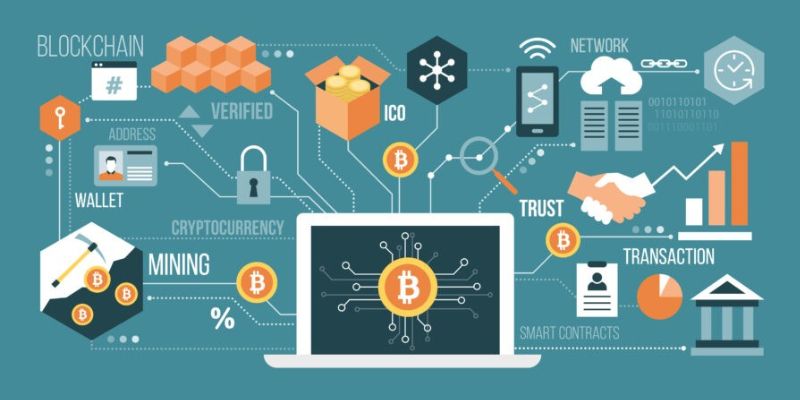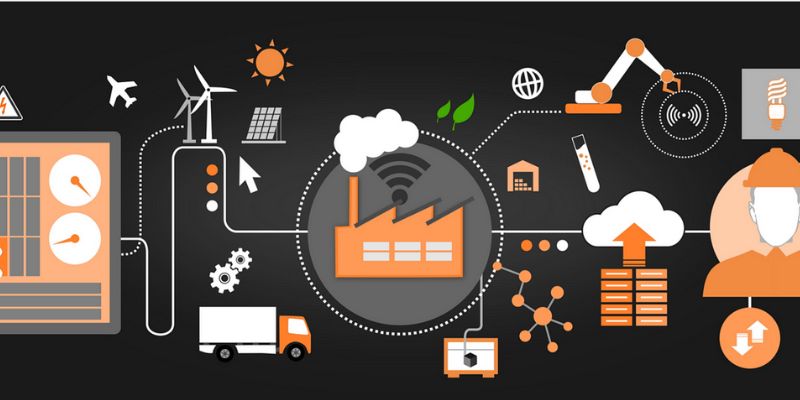Blockchain Revolution: Unleashing Disruptive Potential Across Sectors
Imagine an unshakable digital ledger boosting every sector’s performance. I’m watching the disruptive potential of blockchain across industries unfold, transforming everything from making cars to managing health records. It’s no secret; I get excited about tech. But blockchain, with its power to enhance transparency and secure data, is moving from crypto hype to a business staple. Let’s dive in as I break down how industries are reshaping their future with blockchain – and why they won’t look back.
Transforming Industries with Blockchain: A Comprehensive Overview
Pioneering Blockchain in Manufacturing and Supply Chain Optimization
The way we make and move things is changing fast. Thanks to blockchain, we can now track goods with ease from start to finish. This is huge for making sure things are made well and get where they need to go. Say goodbye to lost packages and hello to happy customers!
Companies can see everything happening in real-time. They know right away if there’s a holdup or problem. This way, they can fix things fast. And the best part? Everyone involved can trust the system because it’s super secure.
Blockchain makes it easy to share info while keeping it safe from those who shouldn’t see it. It’s like giving everyone a peek without risking a leak. From car parts to medicine, this tech is shaking up how we handle all kinds of items in a big way.
Advancing Financial Services through Blockchain Innovation
Money matters just got more exciting. Blockchain is not just a buzzword; it’s a tool that hands power back to the people. Banks and businesses are taking notice.
Imagine sending cash across the world with no big fees. Or your savings kept safe without a bank. This is what blockchain can do in finance. It’s something we’ve all been waiting for, and it’s finally here!
This tech cuts out the middleman. So deals are quicker and we save on costs. With blockchain, every transaction is clear and checks out. We can now handle our money with full control and less fuss.
And it’s not only about money. Contracts go digital and get smarter. They can make deals and pay on their own. No need to wait on people to make things happen. It’s all about getting things done faster and better.
From buying a home to investing pennies, blockchain keeps our money moves sharp and safe. It’s a new day in finance, and we’re just getting started!

Enhancing Transparency and Security in Diverse Sectors
Revolutionizing Healthcare with Blockchain for Data Security
In healthcare, we’re seeing a big shift thanks to blockchain. It makes patient data safe, stops leaks, and fights fraud. With health records on blockchain, only the right people can see them. Your X-rays and test results are on a secure digital ledger. Doctors can quickly get your info with your okay. No more long waits for records to move.
Blockchain tech also stops data hacks in their tracks. It links blocks of data with unique codes. If a hacker changes one block, the whole chain shows the tamper. It’s a game-changer for privacy and trust in healthcare. Patients can rest easy, knowing their sensitive health info is shielded by the strongest tech out there.
Building Trust in Real Estate through Blockchain Adoption
Real estate is not left out in this shift. Blockchain cuts the need for lots of paper and brings down closing times. It’s a clear win for buyers and sellers. You can now use smart contracts on blockchain to sell property. A smart contract is like a digital promise that runs itself when certain things happen. It checks steps and clears payments without extra fees or delays.
With blockchain, there’s no messing around in real estate deals. Every move is there to see and can’t be undone. It means fewer errors, less fraud, and more trust all around. People can buy or sell a house with much less stress and risk. This is how blockchain is making a mark and reshaping how we deal with property.

Blockchain’s Role in Streamlining Operations and Services
Modernizing Cross-border Payments and Finance Industry Practices
Cross-border payments can be slow and costly. But blockchain changes that. It makes transactions faster and cheaper. Blockchain does this by allowing payments to move directly between people, anywhere in the world, without the need for banks or clearinghouses to step in. This is huge for business. People can send and get money quickly and with less cost. This is big for folks working far from home who need to send money back to their families. They save time and fees, so more money goes into their loved one’s pockets.
Folks in finance are waking up to what blockchain can do. It is making things safer and more upfront. With blockchain, every transaction is recorded. So, there is no hiding who sent money where. This makes everything clear and can stop wrongdoing. This trust is helpful for everyone in finance, from big banks to regular people who just want to know their money is safe.
Improving Insurance Claim Processing with Blockchain Technology
When bad things happen, insurance companies step in to help us out. Yet, dealing with insurance can be a pain. It takes a long time and lots of paperwork to sort out. But with blockchain, we can speed up the process. Blockchain lets us share our info safely, keep an eye on our claim’s status, and get our money faster.
Let’s say your car gets bumped in the parking lot. You need to fix it and put in a claim with your insurance. With blockchain, you can send your claim and get it checked fast. Everything is in the open, so it’s quick to see what’s happening with your claim. If someone tries to make a fake claim, blockchain’s record-keeping can catch them. This way, only the right claims get paid.
With blockchain, insurance is less of a headache and helps people when they need it most. Every person’s claim gets sorted out faster, and the insurance folks spend less time on paperwork and more time helping out. It’s a win-win for everyone.
Blockchain is shaking things up – from how we pay for stuff across borders to how we deal with insurance. It is making things faster, cheaper, and more honest. And that’s just the start. With each passing day, businesses and industries find new ways to use this neat tech to make life easier. So, one thing is clear: blockchain is here to stay, and it’s changing the game for all of us.

Blockchain for Social Good and Consumer Engagement
Ensuring Integrity in Voting Systems via Blockchain Solutions
Imagine voting in seconds, right from your phone. Sounds great, right? This can happen with blockchain. By using this smart tech, we can make votes count without a doubt. It’s like an online lockbox that keeps each vote safe. When it’s time to count them, you can’t change a thing. So, every single vote stays just as it should. This way, we know our leaders are picked by real people’s choices.
Blockchain keeps votes safe from any sneaky business. No one can add fake votes or take real ones out. We can check our own votes, but no one else can see them. Because of this, blockchain can be the guard we need for honest elections. With tech getting better, soon we could be using blockchain to pick our leaders.
Fostering Innovation in Education and Entertainment with Blockchain
Now, let’s talk fun – games and learning, anyone? This cool tech can change how we play and learn. Think about getting rewards from a game that you can really use! Or having your school papers safe and sound on blockchain. That’s what’s possible here. In both school and games, you can earn and keep stuff, and nobody can mess with it.
In education, teachers can share lessons far and wide, safe from copycats. Everyone can get to learning because blockchain takes down walls. It makes sharing safe and fair for all. For movies and shows, it’s much the same. Artists get their fair share, and fans enjoy the show. Everyone’s happy when blockchain handles the biz.
Blockchain lights up the way we play, learn, yet keeps it all right. It writes a new story for fun and knowledge, with a happy end for all. We all want our fun and lessons the same way – easy to get and fair. That’s the offer blockchain brings to the table. It’s amazing to see a world where tech does so much, not just in work, but in every part of life. Blockchain isn’t just business; it’s the future of how we do all sorts of things.
In this post, we explored how blockchain is changing the game across various industries. We saw its impact on manufacturing and supply chains, making them both smarter and faster. Financial services are also getting a boost with safer and more efficient transactions.
We then looked at the difference blockchain makes in healthcare and real estate. It keeps data safe in healthcare and builds more trust in real estate deals. Next, we discussed how blockchain is shaping the future of global payments and changing insurance for the better.
Finally, we examined blockchain’s power to do good and keep things honest in voting systems, and its role in revolutionizing education and entertainment.
My final thought is simple: Blockchain is not just a trend. It’s the future, making our lives easier, safer, and more secure. Embrace it, and watch how it can transform the world we live in.
Q&A :
How is blockchain technology transforming various industries?
Blockchain, widely renowned for its pivotal role in cryptocurrency systems, offers a groundbreaking approach to secure and decentralized data management. This innovation is not confined to the financial sector; its immutable and transparent nature has begun to disrupt myriad industries. Healthcare, for example, is experiencing enhanced security and privacy in patient records. Supply chain management is witnessing unparalleled efficiency and traceability, while real estate transactions are becoming more streamlined and transparent. Even the voting systems are exploring blockchain to deter fraud and ensure integrity.
What industries are most likely to be affected by blockchain?
While blockchain technology has the potential to impact virtually every industry, some show heightened susceptibility to its influence. The finance sector is at the forefront, where blockchain promises to revolutionize transactions and reduce fraud. Other sectors poised for significant change include:
- Supply Chain and Logistics, due to enhanced traceability and efficiency.
- Healthcare, for improved data confidentiality and patient record management.
- Real Estate, offering simplified and transparent processes.
- Intellectual Property and Content Distribution, leveraging blockchain for rights management and anti-piracy measures.
Can blockchain technology really disrupt existing business models?
Undoubtedly, blockchain technology harbors the capacity to redefine existing business models by providing a robust framework for trust, transparency, and efficiency. Traditional intermediaries may find their roles diminishing as blockchain facilitates peer-to-peer transactions and smart contracts that automate and enforce agreements without human intervention. This decentralization can reduce costs, improve speed, and create new opportunities for value creation and capture. Enterprises across the spectrum—from finance to media—are investing in blockchain solutions to secure a competitive edge in an evolving digital landscape.
What are the barriers to blockchain adoption across industries?
Despite its transformative promise, the mainstream adoption of blockchain faces several key challenges:
- Scalability: Current technology must evolve to handle the volume of transactions required by major industries.
- Regulation: Uncertain and evolving regulatory environments may stifle innovation and slow adoption rates.
- Interoperability: Diverse blockchain systems need a standardized protocol to work seamlessly across different networks and industries.
- Awareness and Understanding: Companies and individuals must be educated about the benefits and potential uses of blockchain technology.
In what ways can blockchain create new opportunities for businesses?
Blockchain’s inherent characteristics—decentralization, transparency, and immutability—can cultivate new business opportunities in the following ways:
- Smart Contracts: Automate and enforce agreements without intermediaries, leading to new operational efficiencies.
- Tokenization: Convert rights to an asset into a digital token, expanding market access and liquidity.
- Supply Chain Optimization: Offer real-time, immutable records of goods from production to delivery, enhancing trust and collaboration among stakeholders.
- Data Security and Privacy: Provide robust security measures for sensitive data, critical in the digital economy.



